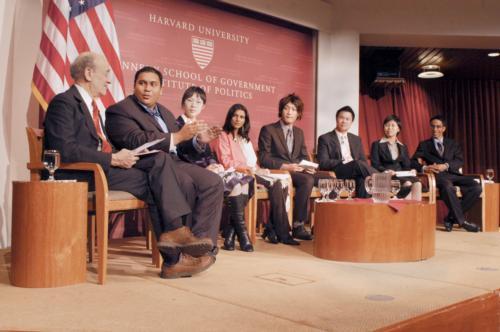
News
Pro-Palestine Encampment Represents First Major Test for Harvard President Alan Garber

News
Israeli PM Benjamin Netanyahu Condemns Antisemitism at U.S. Colleges Amid Encampment at Harvard

News
‘A Joke’: Nikole Hannah-Jones Says Harvard Should Spend More on Legacy of Slavery Initiative

News
Massachusetts ACLU Demands Harvard Reinstate PSC in Letter

News
LIVE UPDATES: Pro-Palestine Protesters Begin Encampment in Harvard Yard
Delegates Debate North Korea
With Asian delegates, IOP forum addresses North Korea's nuclear disarmament

Student delegates from six Asian universities expressed optimism regarding North Korea’s nuclear disarmament program, while also arguing for patience and caution in a panel discussion held at the Institute of Politics last night.
The moderator, Ford Professor of the Social Sciences, Emeritus Ezra F. Vogel, began by asking the student panelists about their reactions to the recent multinational agreement in which North Korea agreed to take steps toward dismantling its nuclear program in exchange for fuel aid. Vogel noted that in light of the recent agreement, yesterday’s discussion was “much more relevant” than originally anticipated.
Last night’s event was organized by the Harvard College in Asia Project as a part of a week-long conference for international student delegates from six different countries.
“I welcome this agreement wholeheartedly, but I’m personally pessimistic,” said Vikram Parsani, a delegate on the panel from the National University of Singapore. “It seems here that the U.S. and China are offering North Korea a bit too much for a bit too little.”
Parsani expressed concern that the fuel that will be given to North Korea as a result of the agreement could potentially be used for nuclear weapons.
“We don’t think the ‘axis of evil’ should have weapons of mass destruction,” said Zaidel Bin Baharuddin of the Universiti Teknologi Malaysia. “But we don’t think the ‘axis of good’ should have them either.”
While the delegates said they were pleased about the prospect of North Korea’s disarmament, they also said there was a long road ahead, noting two key issues that they said will play a role in North Korea’s future—its relationship with its neighbor south of the 38th parallel and of its role in the world economy.
Xu Di of Peking University said international trade could improve North Korea’s economic situation, as it did for her home country.
“Although it may be costly, tolerance and patience with North Korea are really key,” said Lau Ngou Ting from the University of Hong Kong. “As neighbors, we should try to tolerate [North Korea] and let it integrate into the world economy.”
After the panel, Vogel said he was pleased with the discussion.
“These are a bunch of bright students who aren’t professionally trained but who are offering a true student perspective. Maybe their views—the views of both the students speaking and listening—are naïve, but this type of discussion helps give students a general understanding and makes them realize that they should go home and study up on the events.”
Katherine M. Lovett ’07 said she was excited to attend the forum because she wanted to see what the delegates, who have been attending events at Harvard since last Sunday, had prepared.
Want to keep up with breaking news? Subscribe to our email newsletter.
